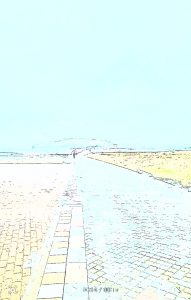雨の宮崎、ふらり神社めぐり
- 2025.04.28
- 月刊芳美
雨の宮崎、ふらり神社めぐり
宮崎市、シェラトン・グランデ・オーシャンリゾート。
チェックアウトの朝、外は雨だった。予定は何も決めていない。ロビーのソファに腰掛け、スマホを開いて、どこへ行こうかと考える。
観光サイトを覗いてみたものの、いまひとつピンと来ない。別の情報サイトを眺めるうち、目に留まったのは江田神社。
「伊邪那岐尊が禊を行った場所」とある。今朝からの雨模様とどこか符合するように感じ、惹かれるものがあった。
車を走らせ、江田神社へ向かう。しかし駐車場に車を入れようとした瞬間、かすかな記憶がよみがえる。
「あれ、ここ、以前来たことがあるな」
迷った末、とりあえず車を停める。外は相変わらずの雨。傘がいるな、とぼんやり思い、そしてふと「奉納する酒でも買おうか」という連想に至る。
近くのセブンイレブンへ向かった。
焼酎の並ぶ棚の前で悩む。白薩摩、薩摩、黒薩摩。結局、白薩摩と薩摩を1本ずつ。ついでにビニール傘、ブラックコーヒー、ピースライトも買った。
車に戻ると、ふたたび雨が強まっていた。
傘を差して焼酎を持って歩く気力が湧かない。そこで、別の場所を探すことにした。
スマホで見つけたのは青島神社。鬼の洗濯板で知られるあの場所だ。
ナビを頼りに向かったが、現地は観光客用の臨時駐車場ばかり。おばあさんに誘導され、500円で車を停める。植物園を抜けて青島へ向かうルートを案内されたが、園内は人もまばらで、ガラス越しに見える蘭の花も枯れかけていた。
そして、参道の向こう、遠くに青島神社の姿。
橋は果てしなく長く、雨脚も強まっていた。濡れた革靴が冷たく、気持ちも次第にしぼんでいく。
「やめよう」
結局、神社へ渡るのはあきらめて車へ引き返した。
トイレに行きたくなり、近くのセブンイレブンへ立ち寄る。用を足し、またピースライトをひと箱買った。
車に戻り、しばし思案に暮れる。
ふと、思い立つ。「もう飛行機で帰ってしまおうか」
しかし、いろいろ検索してみるも、料金も時間も折り合わない。あきらめて、今夜の宿を探すことにした。
スマホで見つけたのは『祈願の宿・地蔵庵』。電話をかけてみたが、当日の宿泊は無理とのことだった。
子宝祈願に興味があったわけではない。ただ、雰囲気が面白そうだったから、少し残念だった。
考えるのも億劫になり、結局、今朝チェックアウトしたばかりのシェラトン・グランデ・オーシャンリゾートへ戻ることにした。
ネットで予約を済ませ、南バイパスを走る。ラジオからは松平健の「踊るサンバ」が流れてきた。
にぎやかなメロディを聞きながら、シーガイアの駐車場へ。
午後2時、チェックイン。
今回は24階、昨日の部屋のちょうど2階下だった。
部屋でこのメモを綴っていると、いつの間にか、外の雨は上がり、陽が差し始めていた。
☔
雨の神域――偶然と意志の交錯について
―宮崎雨中旅にみる「自由意志」と「導き」の小考察―
旅とは、意志と偶然の交錯である。
4月某日、宮崎市シェラトン・グランデ・オーシャンリゾートをチェックアウトした私は、定めなき自由のなかにあった。
この「定めなき自由」こそが、心理学者たちの言う“選択のパラドックス”を生む温床である。
空は雨。天は何を示しているのか。
私はスマートフォンを片手に、観光サイトをさまよい、江田神社という名に出会う。
江田神社――伊邪那岐命が禊を行ったとされる聖地。
神話における「禊」とは、単なる浄化行為に留まらず、自己再編成の儀式である。
雨に打たれる今の私の心象は、まさにそれと重なった。
心理学的には、雨は「内省の促進装置」とされる(cf. A. Maslow, 1962)。
禊の地への無意識的な向かいは、自己の無意識が「再編成」を志向していた結果ではないだろうか。
だが、駐車場に車を滑り込ませた瞬間、記憶の声が告げた。
「ここは、既に訪れた地だ」と。
人間の意識には常に「既知」への回帰衝動がある(cf. Freud, Wiederholungszwang=反復強迫)。
私はこの反復を、意図せず選び取ったのである。
そこからセブンイレブンへと流れた行動もまた、興味深い。
焼酎の選択、傘の購入、そして些細な購買行動に潜む「象徴的奉納」の意識。
モノの選択には無意識的な儀式性が宿る。
白薩摩と薩摩の2本を選んだ行為には、無意識の「二元性への傾斜」が見え隠れする(光と影、陽と陰)。
これはユング心理学で言う「対立物の統合(coniunctio oppositorum)」への衝動ではなかったか。
青島神社へ向かう途中、橋を前にして立ち尽くす。
彼岸へ渡るための橋。雨。革靴の冷たさ。
このとき私は、明らかに「渡ること」そのものに心理的抵抗を覚えていた。
スピリチュアルな視点で解釈するならば、橋とは意識の変容であり、雨とは洗礼である。
つまり私は、「変容」を前に、今はまだ渡るべきではないという直感的サインを受け取ったのだろう。
結局、私は橋を渡らず、セブンイレブンへ戻った。
そして、飛行機での帰還を考えたが、それも叶わず、最初に泊まったホテルへ回帰することになる。
心理学では「コンフォートゾーンへの回帰」は自然な防衛反応とされる。
また宗教的には、「迷いのあとの回帰」は、自己の基底的な安心を求める魂の動きである。
興味深いのは、帰路、NHK-FMから流れた松平健の『踊るサンバ』であった。
明らかに文脈から浮いたこの音楽が、「無意識の解放」「意図せぬ祝祭」を象徴していたことは否めない。
スピリチュアル的には、意図せぬ音楽の介入は「宇宙のサイン」だとも言われる。
最後に――。
この雨の旅で私は、何を得たのか。
何も得ず、何も失わなかった。
だが、禊の雨に濡れ、橋を前に立ち尽くし、元いた場所へ戻るまでの一連の出来事は、
無意識の深層に微細な「変容の種子」を蒔いたのではないかと思う。
旅とは常に、意志を超えた力に導かれるものだ。
たとえそれが、セブンイレブンの駐車場に戻るだけの旅であったとしても。
☔
Rainy Morning in Miyazaki — A Small Journey in the Mist
The morning I checked out from the Sheraton Grande Ocean Resort in Miyazaki, the skies were draped in rain.
With no set plans, I sank into a lobby sofa, thumbing through travel sites on my phone.
The official tourism page left me cold, but an article on Tabiiro caught my eye:
Eda Shrine — an ancient site where the god Izanagi is said to have performed a ritual purification.
Rain and purification.
There was a strange resonance between the weather and the mythology.
I decided to go.
Driving towards Eda Shrine, a faint memory surfaced: I’d visited this place once before.
Still, I parked the car, considering the steady rain. I’d need an umbrella—and perhaps, something to offer.
At a nearby convenience store, I picked up a plastic umbrella and a couple of local shochu bottles,
selecting two at random: Shiro Satsuma and Satsuma.
Returning to the shrine, the rain fell harder.
The thought of walking through the downpour with bottles in hand felt suddenly absurd.
I reconsidered.
Next, I aimed for Aoshima Shrine, famed for its “Devil’s Washboard” rock formations.
But reaching the island wasn’t simple; signs directed visitors to distant parking lots,
where old ladies in raincoats waved at cars with practiced familiarity.
After parking and buying a ticket,
I walked through a quiet botanical garden—disinterested, but drifting along.
Through the mist, Aoshima’s bridge appeared: impossibly long, people like tiny grains of rice crossing under the relentless rain.
Shoes soaked, enthusiasm waning,
I turned back.
Later, after a brief stop at a convenience store and a half-hearted search for an earlier flight home (which didn’t work out),
I ended up booking a night back at the Sheraton.
Driving back along the coastal highway, the radio played a cheerful samba medley sung by Matsudaira Ken—a surreal contrast to the somber weather.
Checking into a room just two floors below my previous one,
I watched as, almost teasingly, the sky began to clear.
☔
In the Rain of Sacred Grounds — A Reflection on Free Will and Divine Guidance
Travel is the collision between choice and accident.
One rainy morning in Miyazaki, after checking out of the Sheraton Grande Ocean Resort,
I found myself adrift in a landscape of “undefined freedom”—a state well-known in psychology as the breeding ground of the paradox of choice.
Drifting through tourist websites, I stumbled upon Eda Shrine,
a site where the deity Izanagi is said to have performed ritual purification.
The rain outside seemed to echo this mythic act of cleansing.
In Shinto mythology, purification is not merely about washing away impurities;
it is a profound act of self-reconstruction.
Psychologists have long noted that rainy days often induce introspection (cf. Maslow, 1962).
Was my journey toward Eda Shrine a coincidence—or the unconscious mind’s desire for renewal?
Yet just before parking, a jolt of memory surfaced:
I had already visited this shrine once before.
According to Freud, human beings are drawn back to the known through the repetition compulsion (Wiederholungszwang).
Thus, without conscious intent, I had circled back.
Detouring to a convenience store, I bought a plastic umbrella and two bottles of local shochu,
selecting them instinctively: Shiro Satsuma and Satsuma.
This act was not random.
The choice to purchase two nearly identical bottles perhaps reflected an unconscious yearning for the union of opposites—a concept Jung termed coniunctio oppositorum.
I then aimed for Aoshima Shrine, but found myself hesitating before its long bridge,
spanning over to the island shrouded in rain.
Bridges often symbolize the passage to transformation; rain, the baptism for such a crossing.
Yet I stopped.
The intuition was clear: Not today.
Instead, I returned to my car, considered flying home early, but abandoned the idea when flight options proved unfavorable.
Ultimately, I booked another night at the Sheraton.
Interestingly, as I drove back along the highway,
NHK-FM played Matsudaira Ken’s cheerful samba medley.
A surreal, joyous intrusion into an otherwise solemn day—perhaps a cosmic nudge toward levity.
In psychological terms, retreating to familiar ground is a defensive mechanism for self-preservation.
In spiritual terms, it reflects a soul’s need to reconnect with its center after facing the unknown.
What did I gain from this rain-soaked journey?
Nothing tangible.
Yet somewhere deep within, perhaps a seed of transformation had been quietly planted.
Travel, after all, is not always about moving forward.
Sometimes, it’s about learning to honor the invisible forces that move within us—even if they only guide us back to a hotel lobby where, at last, the sky begins to clear.
